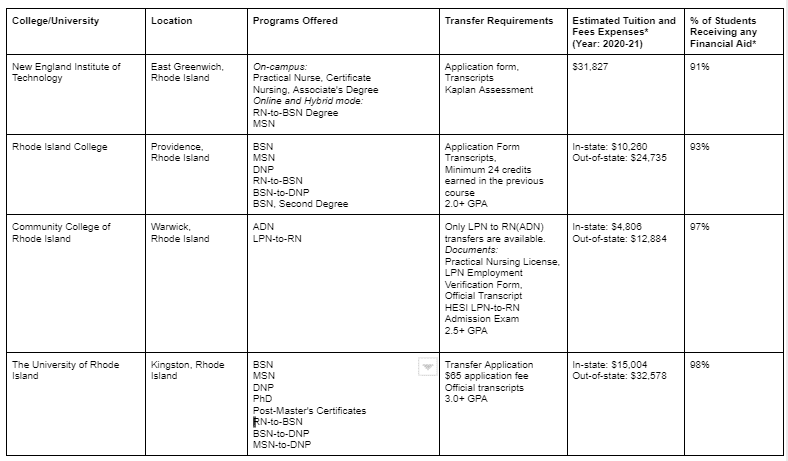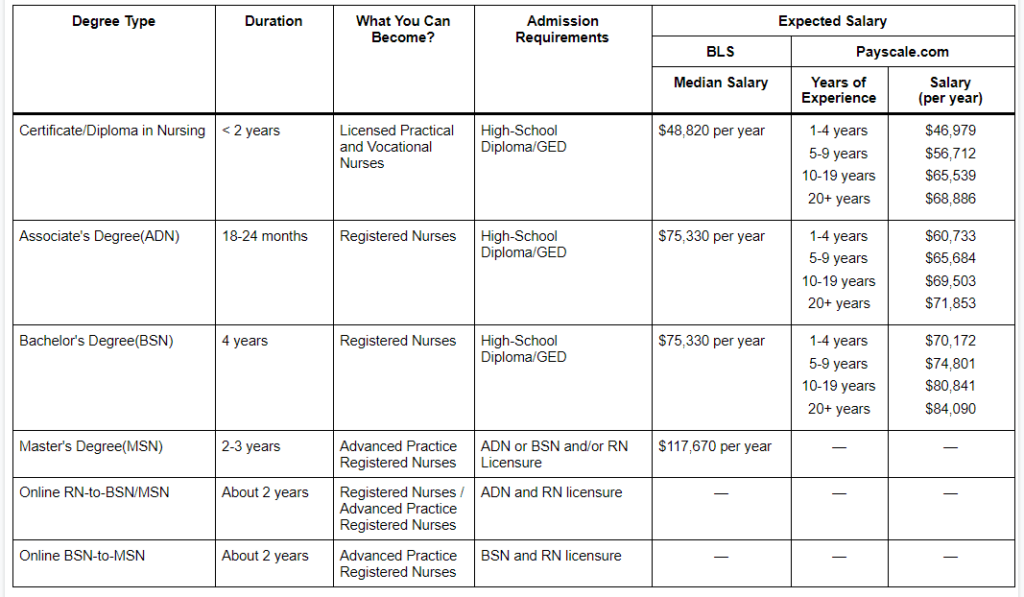Thousands of nursing students transfer schools every year for a wide variety of reasons. Some do it for higher education, while others may want to move to a school that’s closer home. Some transfer students also move because their existing nursing practice programs may not meet expectations.
If you’re searching for nursing programs that accept a transfer student in Rhode Island, read on. Below, we’ve compiled a list of schools where you can transfer to.
Changing colleges can provide significant benefits for your future career. For instance, you may get access to better faculty and infrastructure.
Most importantly, if you’re seeking a transfer for a bachelor’s degree or a master’s degree program, you may have the prospects of a higher salary. Licensed practical nurses with a nursing certification earn a median salary of $48,820 per year, while a registered nurse with a bachelor’s or associate’s degree makes about $75,330 annually on average.
Table of Contents
Where Can I Find Nursing Programs That Accept Transfer Students?
Each college may have a different policy regarding transfer credits, coursework requirements, and standardized test scores. Similarly, the application process for graduate students at these schools may change depending upon the type of transfer students.

Types of Transfer Students
While many colleges and universities have a school of nursing, not all accept transfer students. Some schools only accept specific students who have completed prerequisite courses with at least C+ grades. Many nursing programs provide guaranteed admission schemes for in-state community college students.
Typical categories of transfer students include:
Community College to Four-Year Degree Transfer/RN-to-BSN
If you’ve started your post-secondary nursing education at a community college but wish to transfer to a four-year baccalaureate degree program, you can apply under this category. Similarly, nursing students who have completed their associate degree and want to continue for a bachelor’s at a different school can apply for a transfer.
College Transfer
Students who’ve enrolled for a four-year Bachelor of Science in Nursing (BSN) program can transfer to a new college offering the same degree. Students who fall into this category are often unhappy with their faculty and curriculum or want to relocate to a different city.
International Transfer
Many universities offer international students the opportunity to complete their nursing education in the USA. Some colleges have even made online courses available to students living abroad so that they can access an education from the comfort and convenience of home.
Military
Students who’ve completed some coursework in the military can qualify for a transfer to a two-year or four-year nursing degree. They can also use the credits they’ve earned during their degree in the military to speed up the completion of their degrees.
START YOUR NURSING CAREER
Earn your degree in Nursing from NEIT and begin your new career path today!
ASSOCIATE'S DEGREE
BACHELOR'S DEGREE
MASTER'S DEGREE
How to Choose an Online Nursing Program
If your only goal is to achieve higher education, you can apply for an online nursing program instead of applying as a transfer. Online nursing programs allow you to study at your own pace and from any location without compromising on your existing responsibilities.
Before you apply for an online nursing program, it’s important to consider the following factors:
Accreditation Status
Ensure that the college you’re applying to has received accreditation from the Commission on Collegiate Nursing Education (CCNE) or an equivalent body. Schools that receive their accreditation must follow rigorous academic and infrastructural requirements that the accrediting body recommends. Therefore, selecting an accredited school ensures that coursework meets the minimum academic standards.
Additionally, many employers and nursing colleges only prefer students who have completed their degrees from an accredited college.
Course Duration
Course length and intensity can directly impact your work schedule. If you’re working full-time, you should avoid more demanding programs. You can also apply for accelerated programs that’ll help you get your degrees faster.
On-campus Requirements for Nursing Students
Many nursing programs function in a hybrid mode, while some degrees are online. Hybrid programs are well-suited for students who want to complete their coursework requirements online but attend college for practicum and lab hours. If you’re applying for a hybrid program, check how frequently you’d have to visit the campus.
Specialization
Nursing programs can vary from family nursing practice to advanced gerontology. Selecting a suitable specialization that aligns with your interests or area of work is crucial. Consider a program where you can best apply your skills or disciplines that help make an impact.
Tuition Fee and Financial Aid
A low-cost nursing program may not necessarily be the best option for transfer students. At the same time, high tuition doesn’t always lead to top quality education. Do your research and see what each program offers. You can also look into financial aid options to help pay for your top choice.
Types of Nursing Degrees
You can also apply directly for a four-year BSN degree post-high-school. Although BSN degrees are more expensive and time-consuming than associate degrees, they improve your prospects of a higher salary and better career growth.
Once you obtain your BSN degree and RN licensure, you can continue your education with a master’s degree and apply for advanced practice registered nurse (APRN) roles. If you want to get into research, you can earn your doctorate in nursing (DNP).
Below, you find a summary of the different types of degrees and the salaries they can help secure.

Applying for a Nursing School Transfer
The application process for new admission and transfer students does not vary much. You’ll have to fill out the application form, submit the required documents, pay the application fee, and wait for the results.
Listed below are some considerations to keep in mind when applying for a transfer:
Application Materials
Every nursing school has a different set of admission requirements. Some may require you to obtain a letter of recommendation from your faculty, while others only ask for official transcripts. Nevertheless, it is always best to keep all your documents in place as it’ll help you apply to multiple colleges easily and efficiently.
Typical application materials may include:
Application Form
Your college application includes your personal information, academic history, and contact details. Some colleges may also have short questions asking you to explain your motivations for the courses.
Official Transcripts
Colleges may require transfer students to submit both their high-school and college transcripts. A transcript details the courses you’ve completed and the grades you’ve obtained in each. You can also contact your college or school to directly send the transcript to the colleges where you’re applying. Your high-school transcript helps verify your previous academic credentials, while a college transcript is crucial while transferring credits.
Standardized Test Scores
Some nursing schools require your SAT/ACT scores as a part of their admission requirements. A good SAT/ACT score can improve your chances of selection.
Essay/Purpose Statement
You may have to submit a short essay describing why you want to join, your academic interests, goals, etc.
Letter of Recommendation (LOR)
Universities may require recommendation letters from your professors, mentors, or bosses as it helps provide a personal context to your official documents.
Application Fee
Most programs levy a non-refundable application fee. However, some may offer a fee waiver for aspiring students facing financial hardships or aspirants from low-income families.
While SAT/ACT scores, essay, and LORs may not be necessary at every college, your application form and college/high-school transcript is an indispensable part of your application.
When Should I Begin the Application Process?
Ideally, you should start applying for a transfer about 4-6 months before your classes begin. Schools may take several months to notify and shortlist students.
Most importantly, if you begin early, you’ll have plenty of time to apply for financial aid.
How to Transfer Colleges
Transferring colleges may seem tedious and confusing. Plus, you may face uncertainties about whether your transfer credits will apply or not. There’s also a chance you’ll have to retake some coursework even if you have already completed it at your previous school. Therefore, you must be very careful while filling out transfer applications to ensure that you include all details.
If you want to transfer between nursing programs, follow the steps below for a hassle-free experience:
- Research prospective schools that accept transfer students and shortlist those that match your requirements.
- Check whether the school has received accreditation or not.
- Get in touch with the academic counselor at each of your shortlisted nursing schools.
- Find out how many credits will transfer and the courses that you may have to take again
- Plan how you’ll pay your tuition fee. Search for all federal grants, scholarships, and financing options.
- Compile a list of all the documents that your prospective schools require, and get them ready beforehand.

Requirements for a Transfer to a Nursing Program
Nursing programs may have unique transfer requirements. When searching for the best nursing schools in Rhode Island, it’s important to visit the college’s website or talk with the admission advisor to understand their process.
Let’s take a look at the prerequisites for credit transfer at the New England Institute of Technology:
- You can transfer a maximum of 46 quarter (30 semester) credits for an associate degree program or 42 quarter (28 semester) transfer credits for a bachelor’s degree program.
- You must earn a minimum grade of ‘C’ for non-health science courses and at least a ‘B’ grade for graduate courses.
- RN-to-BSN transfer students must complete the following prerequisite courses (or equivalent) with a grade of “C+” or better:
- BIO 107 Comprehensive Anatomy & Physiology I with Lab
- BIO 127 Comprehensive Anatomy & Physiology II with Lab
- BIO 122 Microbiology
- PS 140 Lifespan Development
- SO 203 Social Problems
- Two Humanities Electives
- EN 100 Introduction to College Writing
Every school may have similar prerequisites. We can divide these typical requirements into the following categories:
Number of Credits Eligible for Transfer
To avoid spending unnecessary time repeating your courses, you must confirm the number of credit hours from your previous college that will transfer. Some schools may accept all the coursework you’ve completed, while others may not approve any credit.
Each nursing program has a different credit evaluation system which helps colleges decide whether your credits will transfer or not. Suppose you have completed an ‘Introduction to Chemistry’ course in your previous college, but the college’s looking for ‘Fundamentals in Chemistry.’ Here, a different course title may lead to credit rejection.
Students may run into the following issues when transferring credits:
Course Equivalency
Your new college/university will evaluate your previous curriculum to determine coursework equivalency. They may check the curriculum, the number of lectures and lab hours, etc., to check whether you can skip a similar course. On the contrary, some courses may only qualify as a general elective. The credits you earn in these courses will not transfer.
Course Level
The course’s level often plays a crucial role in determining transfer eligibility. Lower-level courses such as seminars and laboratory work may not apply. Similarly, higher course numbers or specialized electives may not transfer.
Quarter vs. Semester Transfers
Schools may follow a quarter or a semester pattern. A single semester class is equivalent to two quarter classes. Therefore, a course spanning two quarters may count as a single semester class.
Let’s say you have completed ‘Chemistry 1’ and ‘Chemistry 2’ classes in a quarter system. A school that follows a semester system will usually count it as one class.
Transfer Eligibility
Another essential factor is eligibility. In most cases, you are eligible for transfer only if you’ve completed at least one year of nursing education. Most nursing programs only accept students into the second year or higher.
The competition is high because of limited transfer seats. Simply fulfilling eligibility requirements may not prove sufficient. Suppose the minimum GPA requirement for a university is 2.5. The actual cut-off may be as high as 3 – 3.5.
Special Transfer Options
Depending on how much coursework you have completed, you may be eligible for special transfer options. For example, suppose you’ve completed all your general education requirements. In that case, you can obtain your RN-to-BSN at the New England Institute of Technology in just eight months or two semesters.
Benefits of Transferring from a Community College to a Four-year School
Instead of paying for four years of tuition at a private university, you can save significantly on tuition costs by completing the first two years at a community college. There, you’ll pay just a fraction of what you’ll pay for a four-year school.
Many community colleges also have affiliations with state universities. These partnerships ensure that most of your credits transfer so that you can complete your degree faster.
Are There Any Scholarships for Transfer Students?
It’s a common misconception that only the new intake of students gets funding and scholarships. Several grants are available for both new and transfer students in nursing. Besides federal and private institutions, many colleges and universities also offer their own scholarship opportunities for nursing students.
Funding opportunities include:

Conclusion
Many schools offer excellent opportunities for transfer students to complete their nursing degrees or pursue advanced nursing courses. If you want to transfer to a nursing college, you must read the guidelines and eligibility requirements before beginning the process.
The New England Institute of Technology offers comprehensive associate’s, bachelor’s, and master’s programs in nursing for new and transfer students. Our comprehensive curriculum combined with cutting-edge infrastructure ensures that you have all the necessary skills to become competent nursing professionals.
START YOUR NURSING CAREER
Earn your degree in Nursing from NEIT and begin your new career path today!
ASSOCIATE'S DEGREE
BACHELOR'S DEGREE
MASTER'S DEGREE
FAQs
How Do I Find Out if My Credits Will Transfer?
Each school has a different policy for credit transfer based on the course equivalency, level, grades, and curriculum requirements. Therefore, before applying for transfer, read the university guidelines or talk with the admission counselor at your prospective schools to determine which credits will transfer.
What GPA Is Required for Nursing Transfers?
The GPA requirements for nursing transfers may vary depending on the number of applications and available seats. Most schools set 2.75-3.0 as the minimum GPA requirement for transfer students. However, accepted students tend to earn higher grades than outlined by the eligibility requirements. A 3.25-3.5 GPA is necessary to improve your transfer prospects.
What Documents are Necessary for Transfer Applications?
While filling out your transfer application, you’ll have to submit a college-specific form with your high-school/college transcripts. Many schools also ask for standardized test scores, recommendation letters, and essays from transfer students. Therefore, keeping the following documents ready beforehand can help you apply to multiple colleges without any hassles:
- Application Form
- Official transcripts
- SAT/ACT score
- Recommendation letters
- Essay

